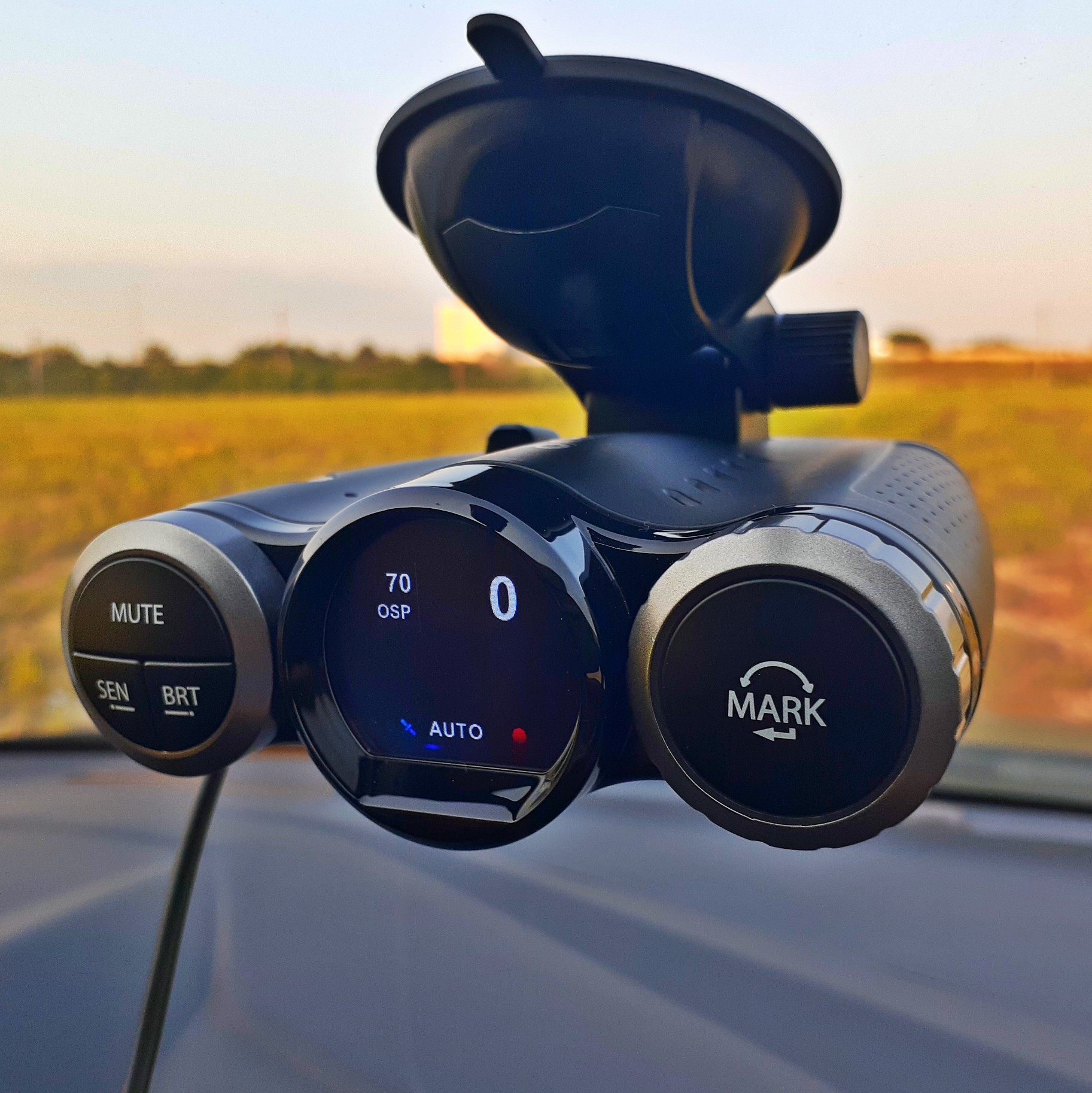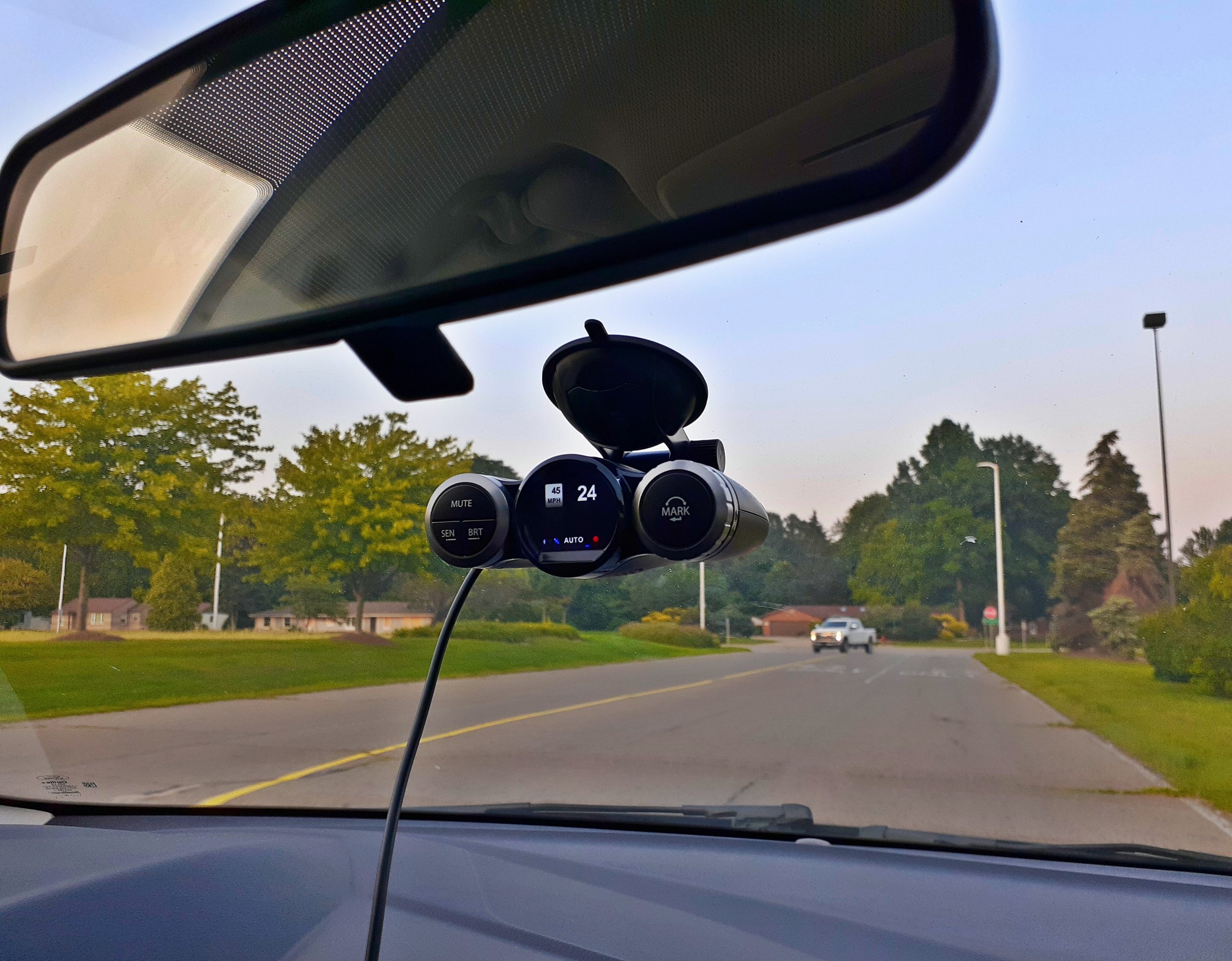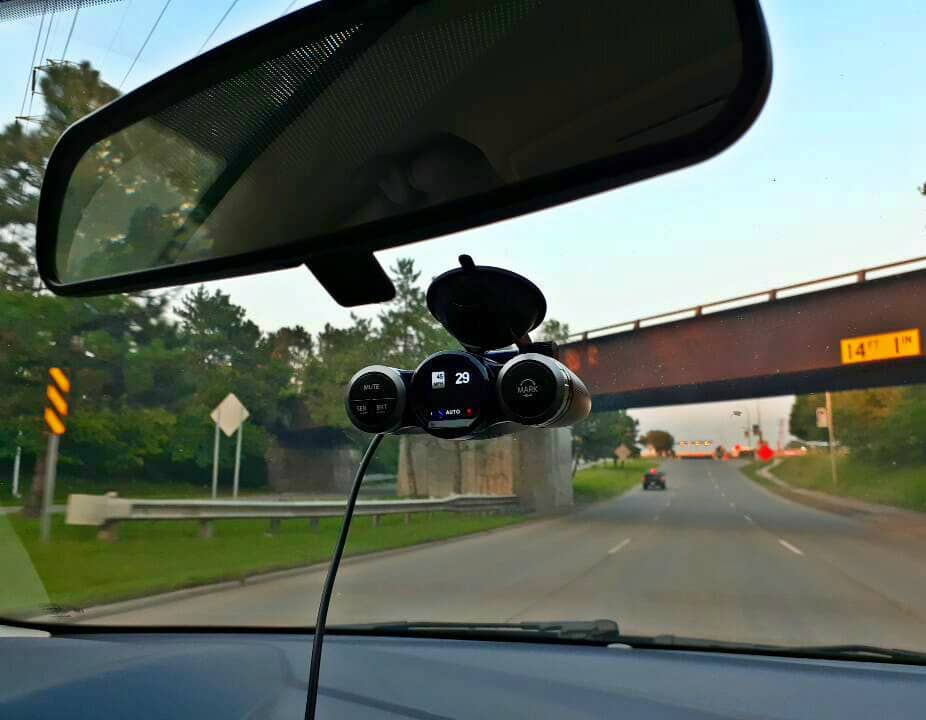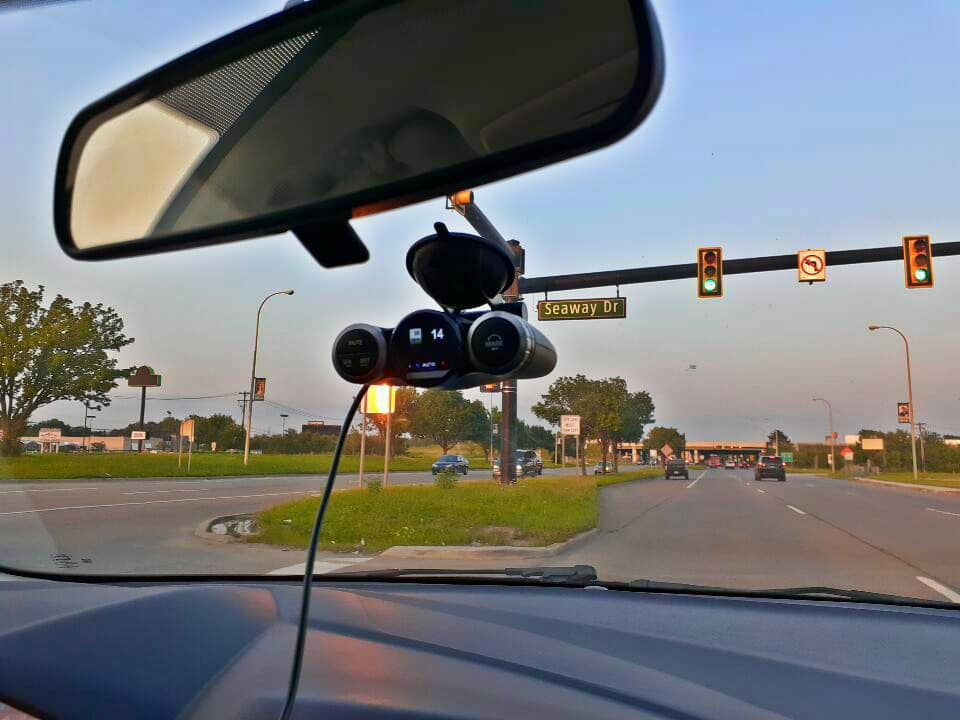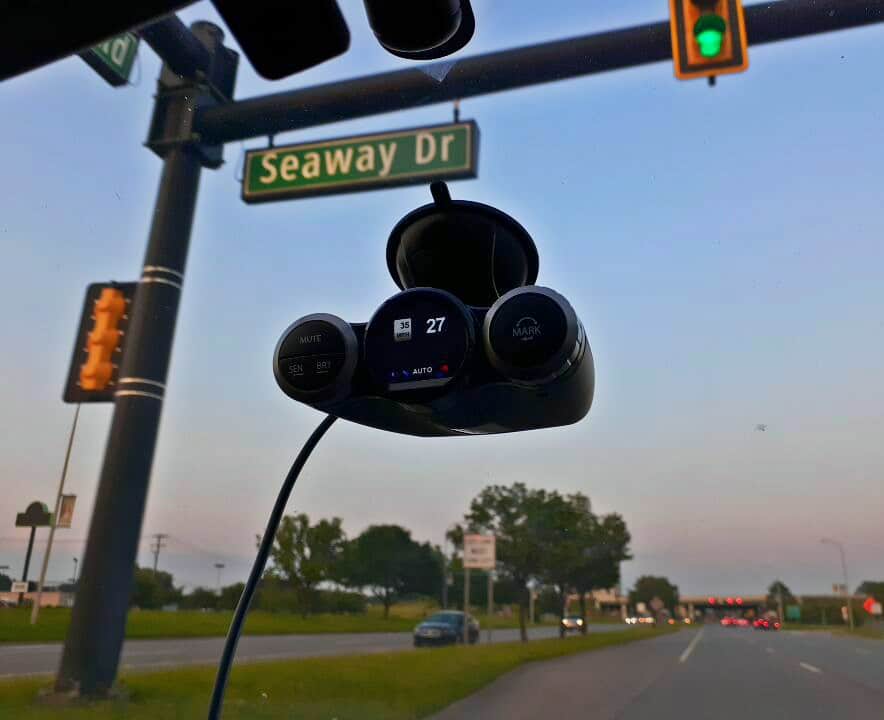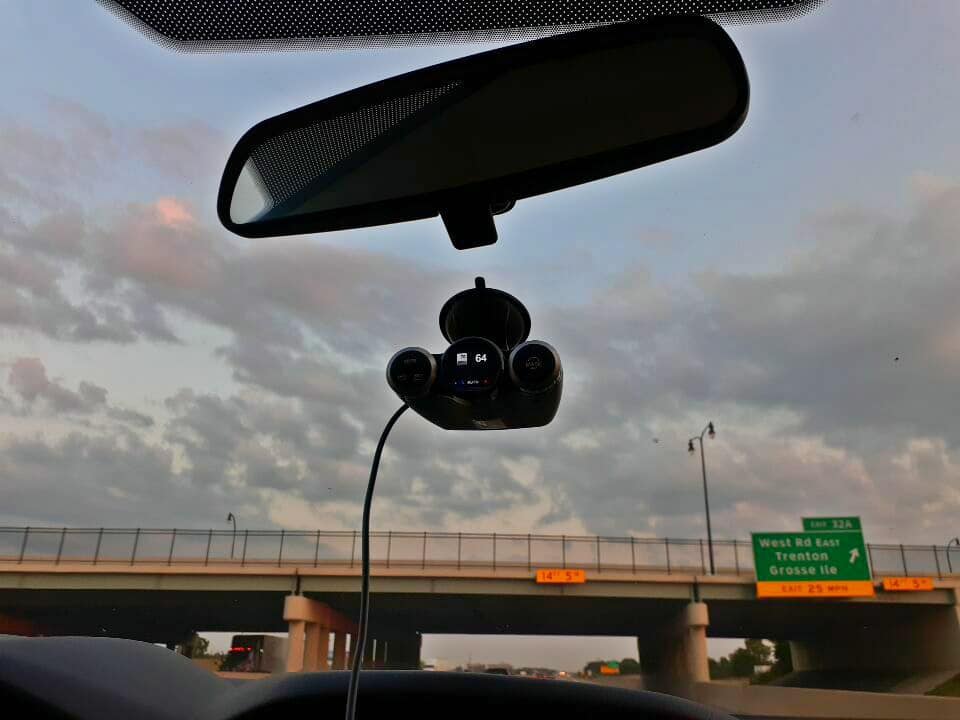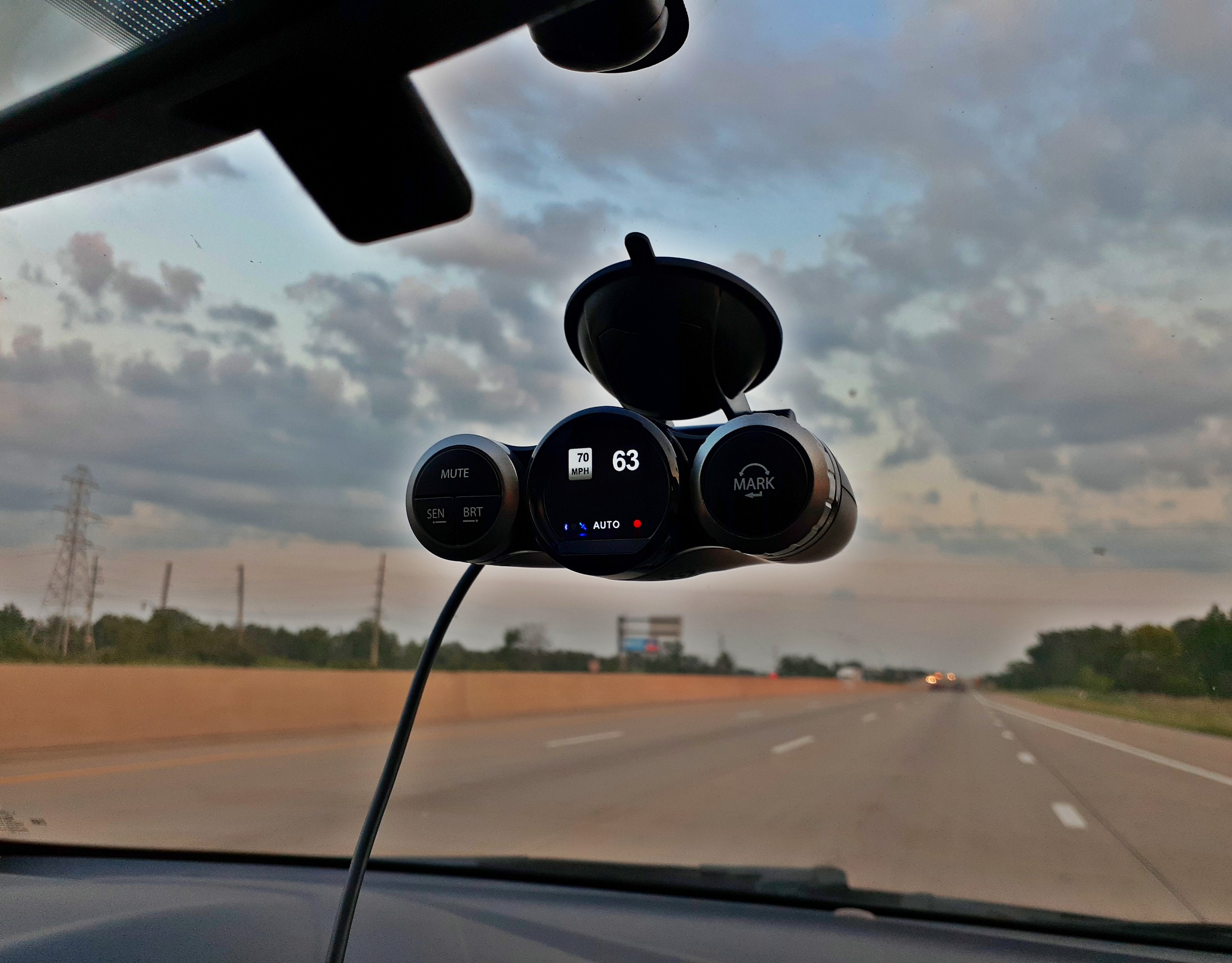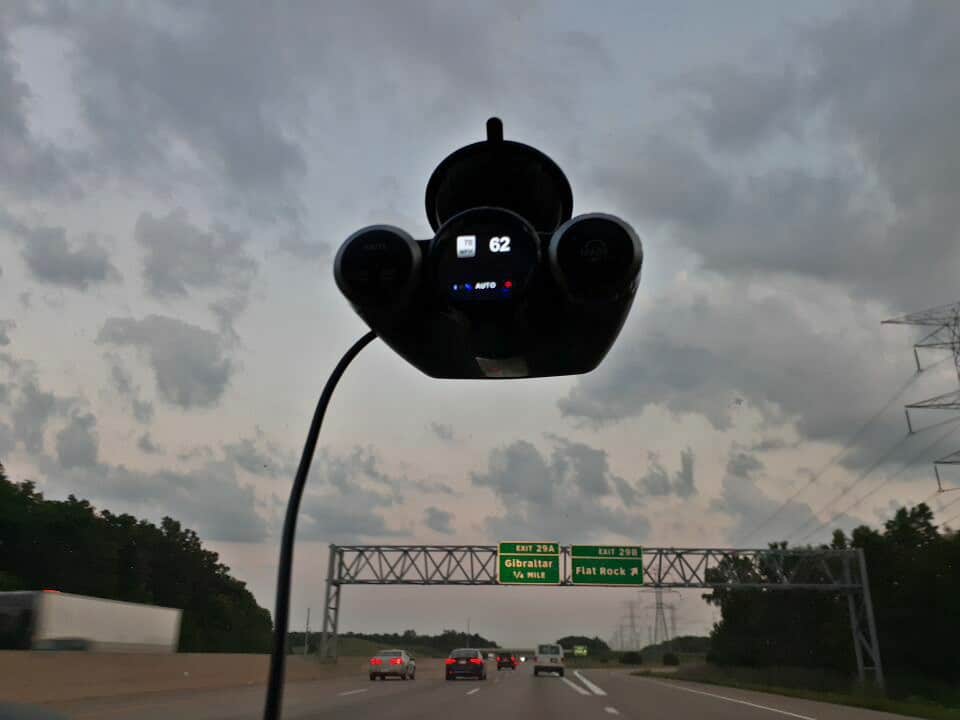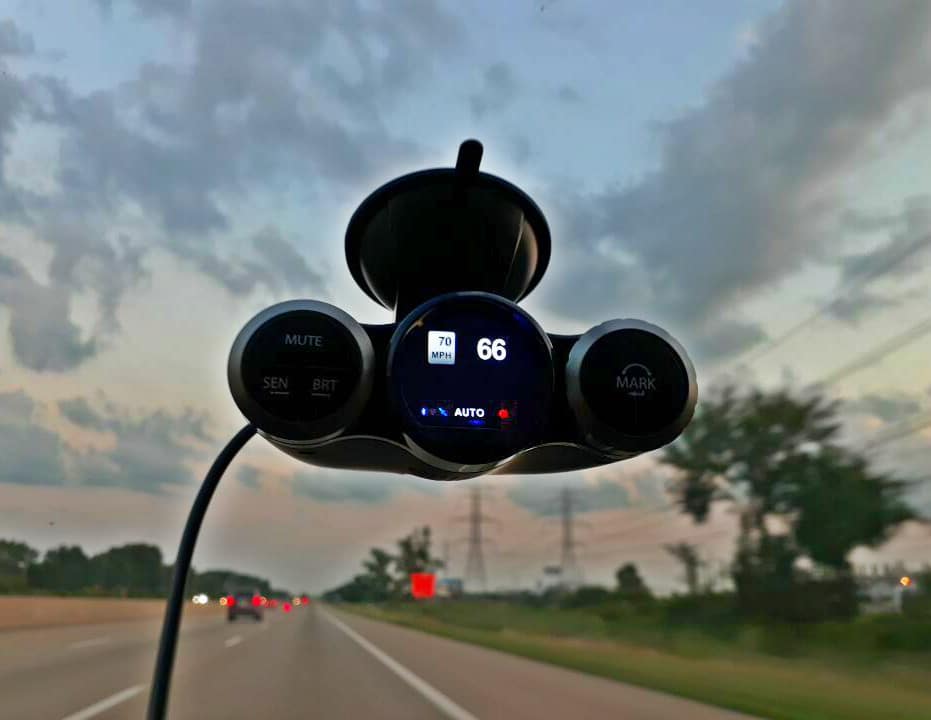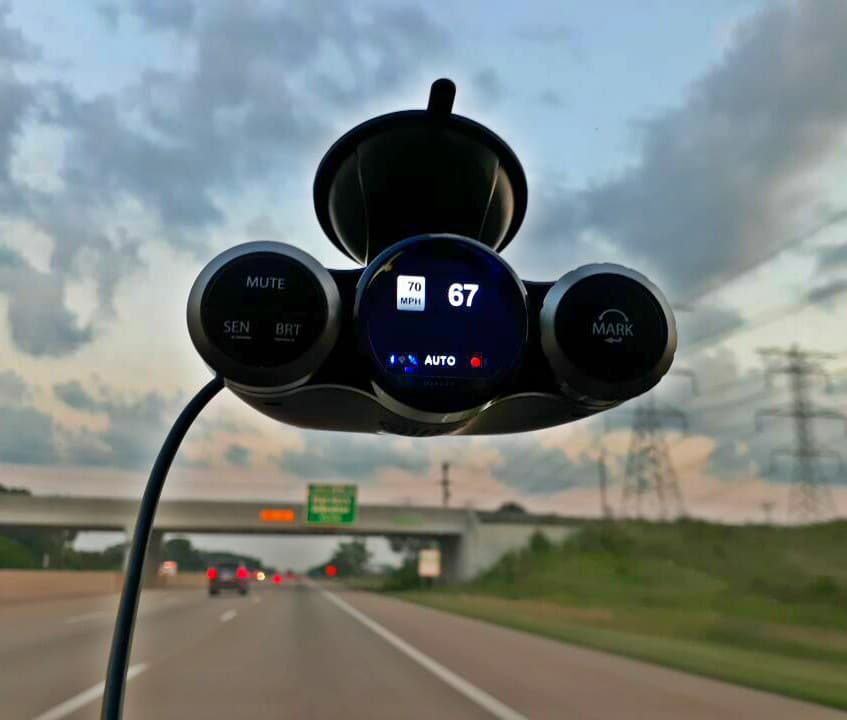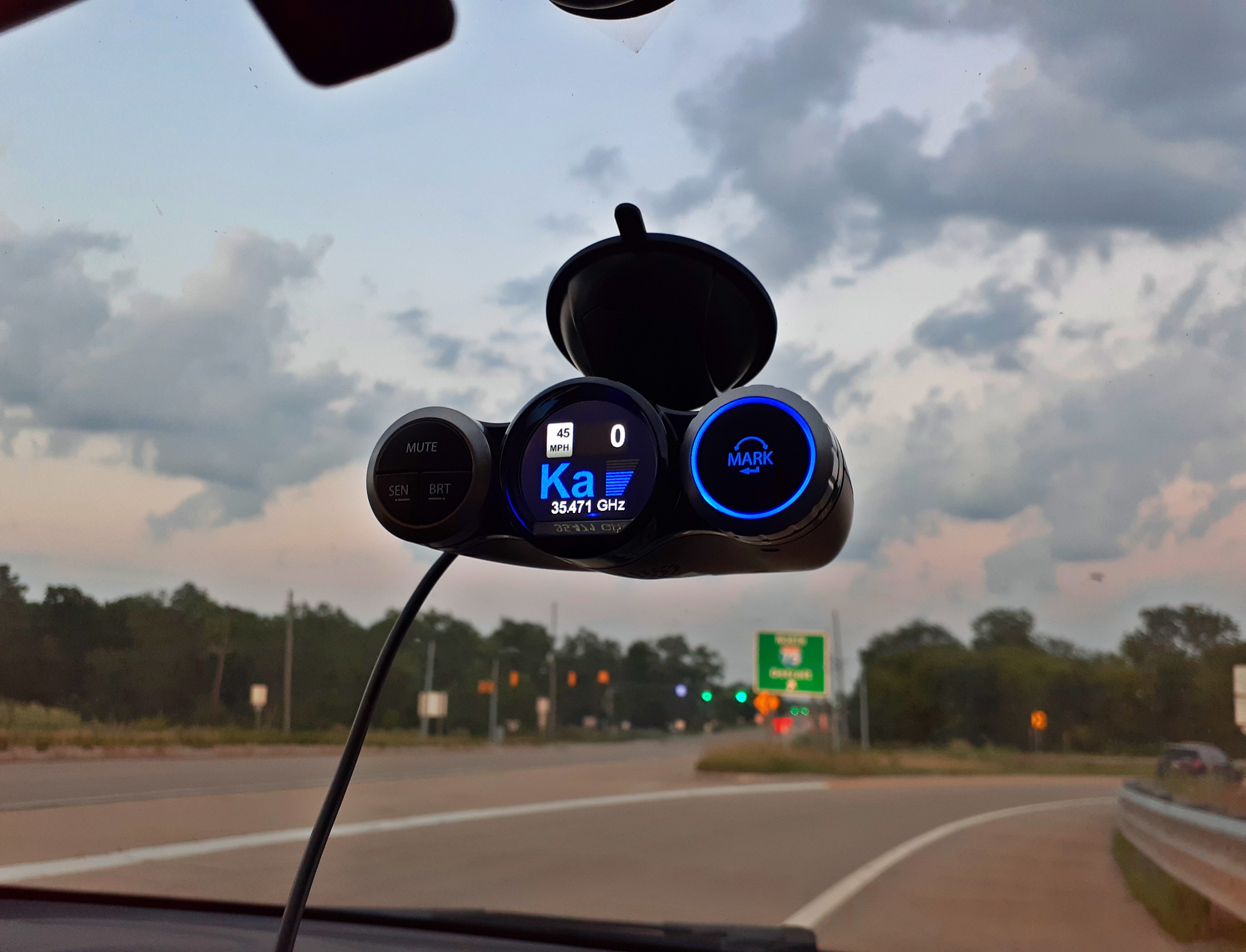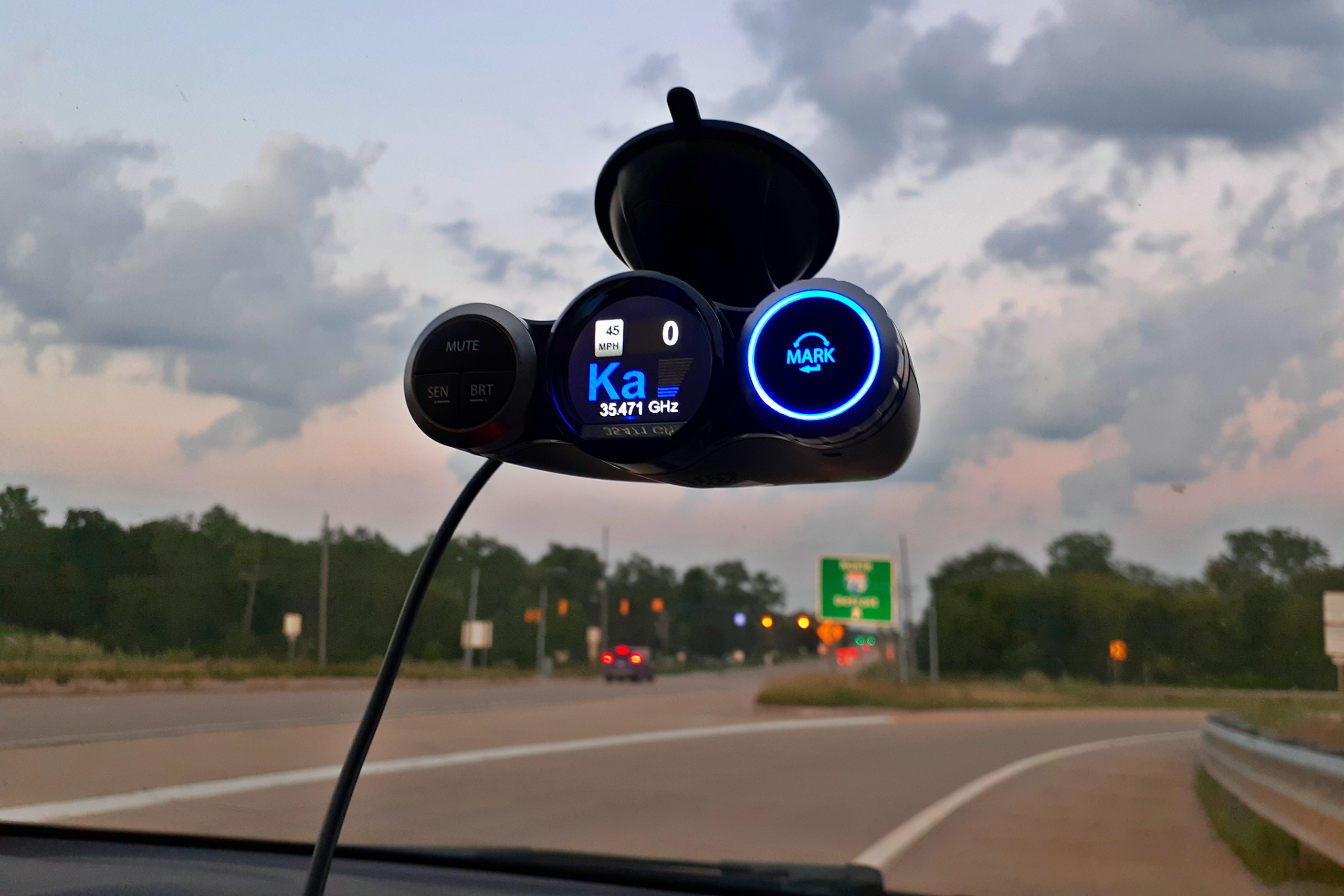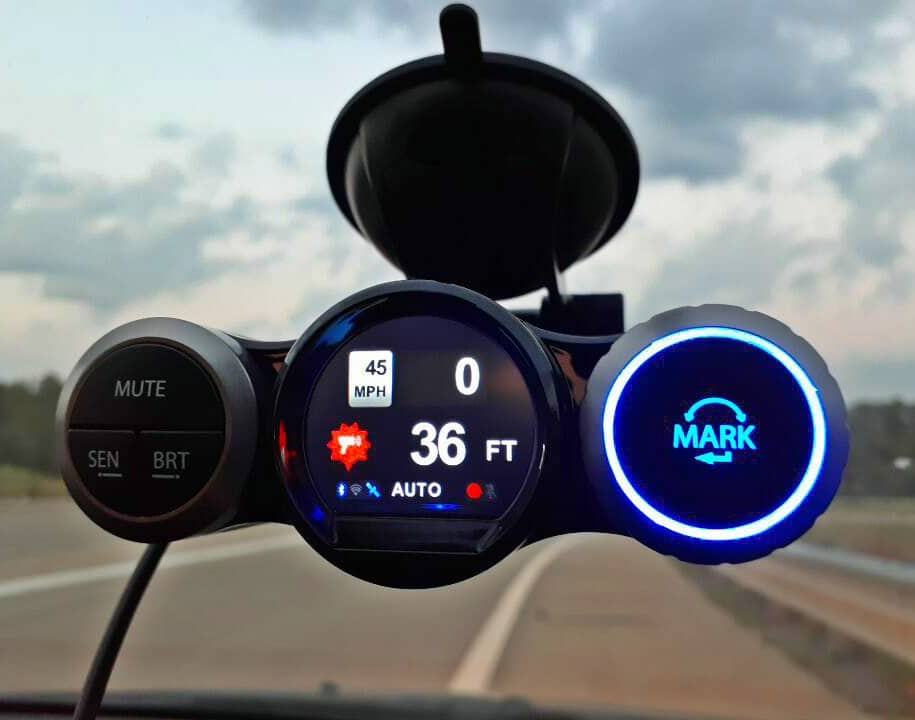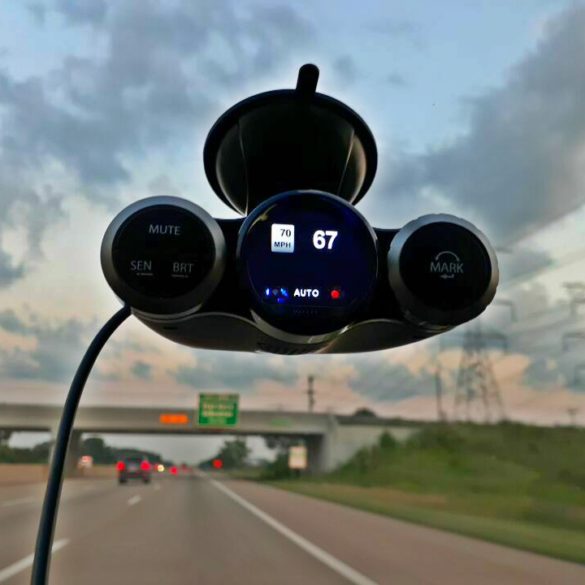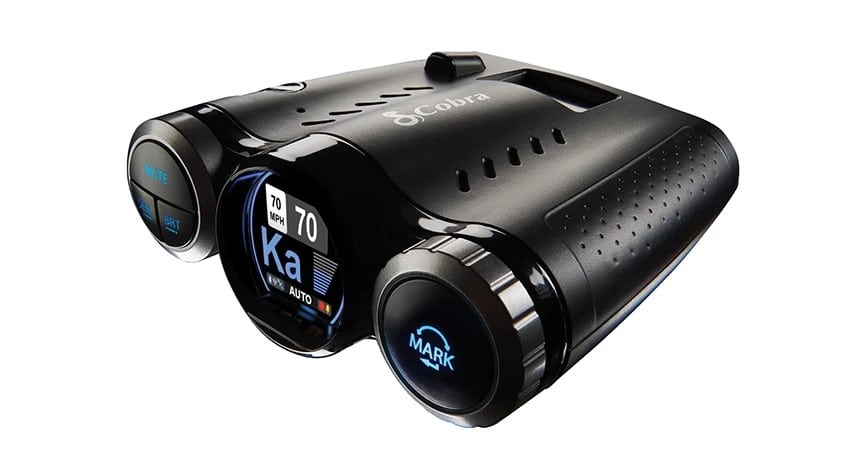Affiliate Disclosure: As an Amazon Associate, Automoblog earns from qualifying purchases, including the items featured below. Cobra Electronics, an affiliate partner, supplied the Road Scout seen here. Automoblog is a member of the Radar Detector and Countermeasures Forum to ensure truth and accountability when covering radar detectors. See our Privacy Policy to learn more.
Radar detector or a dash camera? How about both integrated into one unit? That’s the idea behind the Cobra Road Scout, a two-in-one driving companion with a 1080p HD dash camera and a radar detector. With the radar detector portion of the Road Scout, you can adjust the sensitivity of the X and K bands, mute false alerts, and mark locations like speed traps and red light cameras. Meanwhile, the dash camera offers a g-sensor and an emergency recording feature.
We recently spent three weeks driving around metro Detroit with the Cobra Road Scout. Unfortunately, my overall opinion of this two-in-one combo is mixed at best. Having a dash camera and a radar detector in one unit is an attractive proposition, but as far as the Road Scout is concerned, it’s an excellent idea with below-average execution. In this review, I will run through the Road Scout’s “spec sheet” and elaborate on my experience with the unit a little further.
Why Buy a Radar Detector/Dash Cam Combo?
Insurance providers and cable companies are always talking about the benefits of “bundling” your services. And in so many words, Cobra Electronics has done the same thing with the Road Scout. Opting for something like the Road Scout has three main benefits.
Purchase Price
Depending on which radar detector and dash camera you are considering, buying a “bundle” like the Road Scout may save you a little money. Instead of buying two separate units, you purchase one and hopefully avoid spending extra cash. As of this writing, the Road Scout retails for $400 on Cobra’s website and through Amazon for the same price.
Saves Space
With a two-in-one combo like the Cobra Road Scout, you don’t need to mount both a radar detector and a dash camera to your windshield.
Don’t Have To Decide
When I take my twice-yearly 900-mile drive from Michigan to South Dakota to visit family, I can make a case for mounting a dash camera to my windshield. Likewise, I can also make a case for wanting to have the protection and features afforded by a high-quality radar detector. The Road Scout gives you two desirable items in one package – a radar detector and a dash camera – for a long trip like this.

Cobra Road Scout In-Depth: What It Offers
The Road Scout comes with a suction cup windshield mount (called the “EZ Mag Mount”), a 12-volt SmartCord USB power cord (so you can still charge your phone), and a 16GB SD card and micro USB cable for the dash camera. A handy travel case and a quick reference guide are also included.
Installation is easy with the windshield mount and USB adaptor cord. Once the Road Scout has power, both the radar detector and dash camera are active. Despite having dual functionality, the unit is surprisingly lightweight at just eight ounces. The included mount easily secures the Road Scout to the windshield. It stayed put the entire time during my three-week drive.
The Road Scout is compatible with Cobra’s iRadar app. With the app, you can either report or receive real-time alerts generated by an entire network of users. iRadar alerts include red light and speed camera locations, speed traps, air patrols, photo-enforced locations, and other caution areas. In addition to the iRadar app, the Road Scout can connect to an in-vehicle Wi-Fi hotspot for software and database updates.
Radar Detector
The Cobra Road Scout will alert you to X, K, and Ka radar bands and laser (LiDAR) guns from the front and the rear.
Sensitivity Modes
Pressing the SEN button will allow you to adjust between three different sensitivity modes: Low, High, and Auto. During our three-week drive, we stayed in Auto most of the time, which is speed adjusted. As described by Cobra in the owner’s manual, at 50 mph and above, X and K bands default to the maximum range while the Ka-band detection range is always at its maximum, regardless of the sensitivity setting. That is likely because Ka is the most common band law enforcement uses today.
Cobra’s exact verbiage here may seem strange using the word range, but we believe they mean sensitivity based on their descriptions of other radar detectors in their product lineup.
In other words, the Low and High settings on the Road Scout are similar to City and Highway on other radar detectors. Generally speaking, you use City mode (more filtering) to reduce the sensitivity of X and K bands to mitigate false alerts, while Highway increases the sensitivity (less filtering) to each radar band to give you the most reaction time on the open road. Auto is the speed-dependant mode that automatically switches between City and Highway, or Low and High in the Road Scout’s case.
Display Indicators
The sensitivity mode appears on the bottom middle portion of the Road Scout’s display. The colorful display has several important “indicators” (as Cobra calls them). These indicators include GPS, signal band and strength, camera and microphone, a scanning bar, and speed alerts (when connected to the iRadar app). You can switch the frequency display feature on via the settings menu if you like. If so, the GHz measurement will appear below the signal band and strength indicator.
To access the menu, hold the SEN and BRT buttons simultaneously. BRT is short for brightness, of which there are several settings.
Detection Range
One potential (if not significant) drawback is the Road Scout’s detection range and reaction time. I received Ka alerts on two occasions only to find the patrol cars nearly on top of us. The first was a Michigan State Police car on M-10 through Southfield near Telegraph Road and the 696 interchange. The Road Scout picked up the officer’s Ka band from the rear, but only a few car lengths back. The second alert was from a Wayne County Sheriff deputy on Telegraph Road (also a Ka band). It was a similar situation: the deputy’s Chevy Tahoe was only a short distance away. In both instances, the Cobra Road Scout came late to the party.
It’s possible both officers were doing what is known as “instant-on” radar, a popular tactic law enforcement uses to beat radar detectors. However, we have driven those areas here in Detroit many times before, especially while evaluating and reviewing radar detectors. More recently, we drove the same areas with our Escort MAXcam 360c, another two-in-one radar detector and dash camera combo. By contrast, the MAXcam alerted much faster and with a greater detection range.
Unfortunately, the Road Scout leaves a lot on the table regarding long-range detection. We surmise this is partly because of the price range of the Road Scout ($400) versus something like the MAXcam, which is double the price.
False Alert & IVT Filtering
Although detection range is an issue, the Cobra Road Scout makes up for it by offering a solid false alert filtering system. The IVT Filter (or in-vehicle technology filter) prevents any potential false alerts that could be triggered by the advanced safety features on other vehicles around you. This includes radar-sensor-dependant systems like adaptive cruise control and blind-spot monitoring. Even in heavy Detroit traffic, the IVT filter works flawlessly.
Most impressive was how the Road Scout is impervious to malls, shopping plazas, grocery stores, and other similar fixed location false alerts. If you receive a false alert, you can silence it via the MUTE button on either the USB power cord or the unit itself.
GPS Lockouts
This feature never thoroughly worked for me, and it became one of the most frustrating things about the Cobra Road Scout during my three-week drive around Detroit.
In the owner’s manual, under the “GPS Filter” section on page 11, Cobra says the feature enables you to store fixed location false alerts to the Road Scout’s memory. To store a false alert location, press MUTE three times during said alert, either on the unit itself or the USB power cord. If you are connected to the iRadar app, you can also lock out these false alerts via your smartphone. Subsequent alerts to this signal will be muted and displayed in gray.
As of late, I have been making a daily trip to the Grosse Pointe area of Detroit. On my way, I encounter a pocket of ongoing road construction on I-94 with digital speed limit warning signage (the Road Scout flags it as a K band alert). No matter how many times I lock that false alert out, it never works. I have hit the MUTE button (three times, as the owner’s manual says) on the USB cord and the unit itself. I also tried locking it out with my phone through the iRadar app. No luck.
The false alert turned gray, just as Cobra says in the owner’s manual. However, when I drove through the road construction zone again, the Road Scout alerts as usual as if nothing changed. For whatever reason, the lockouts don’t stick.
Based on my experience, the Cobra Road Scout struggles with digital signage. The gallery below includes three photos of the John C. Lodge Service Drive in Detroit, a one-way street that runs north and south above the faster-moving M-10. The first photo is an aerial shot from Google Maps, with the red arrows representing where two different digital speed limit signs are located (approximately). The other two photos, also from Google Maps, show the signs up close.
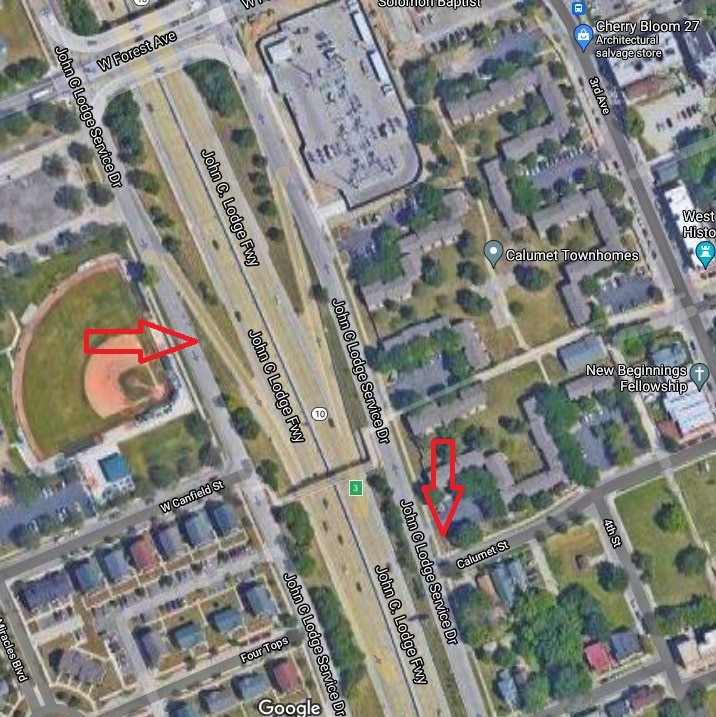
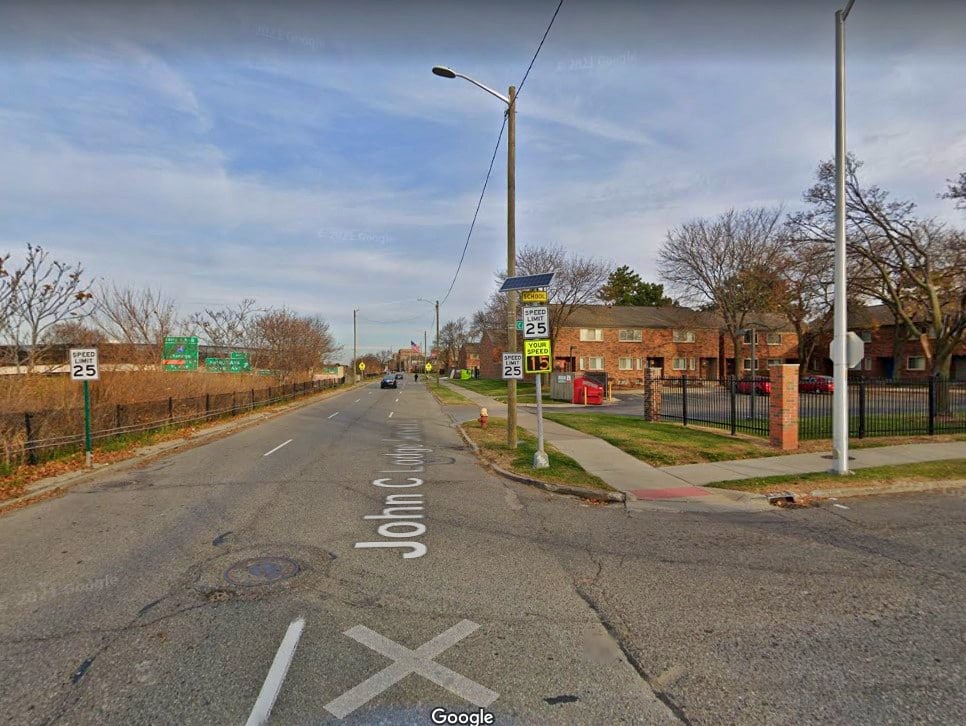
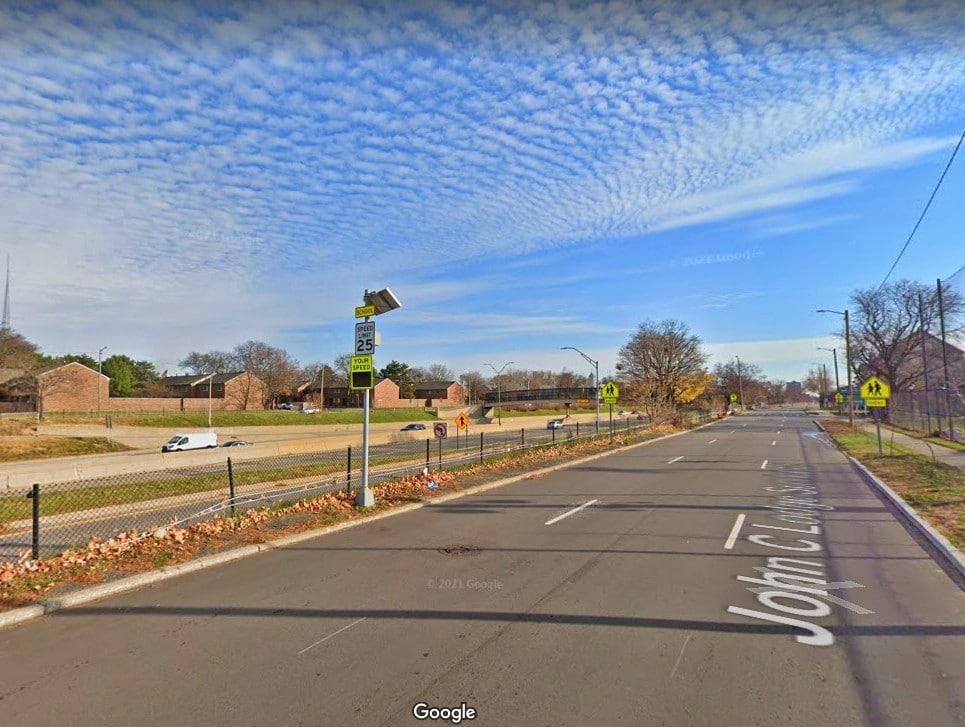
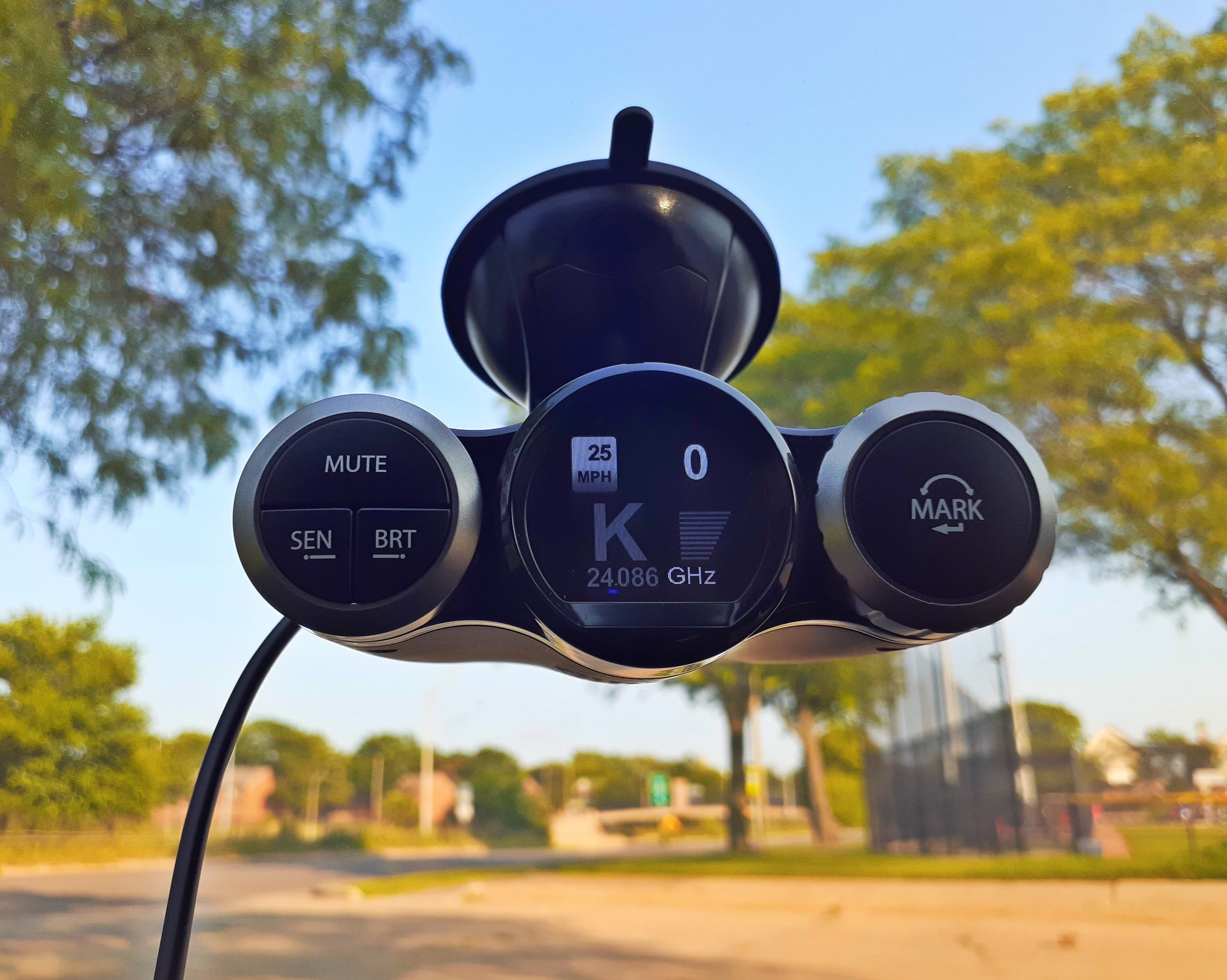
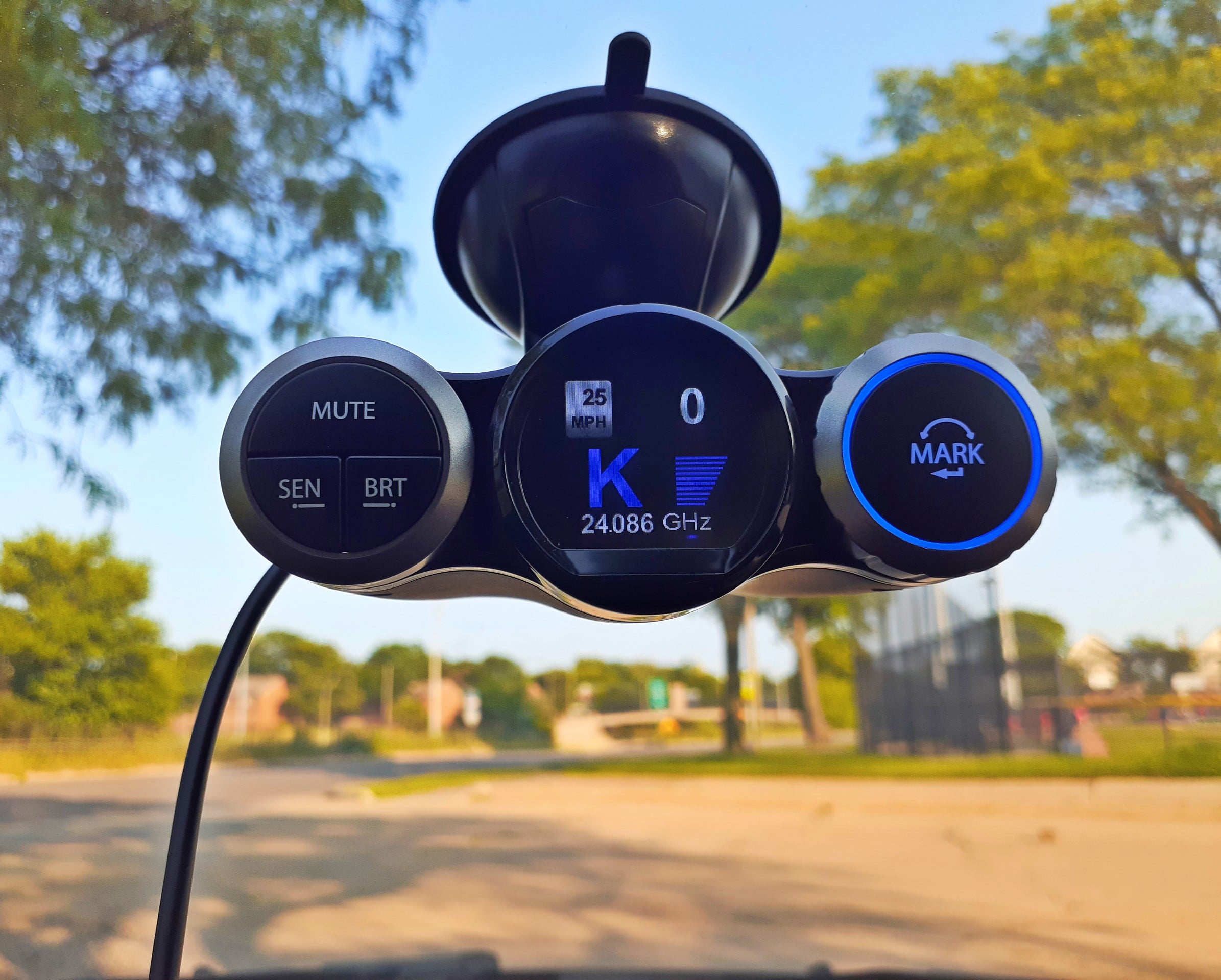
- The display turns gray when locking out a false alert. However, I have yet to get the lockouts to stick. A few days later, the Cobra Road Scout would issue an alert in its standard blue when driving through the same area with the same digital signage. It’s like it “forgets” manually imputed lockouts.
In this particular area, you can turn a perpetual circle on John C. Lodge if you drive up to Forest Avenue, then back down to Martin Luther King Jr. Boulevard. By doing so, you will encounter both the digital speed limit signs in the photo gallery above.
I lost count of how many loops I did trying to get the Cobra Road Scout to lock out both of these signs. I believe it took about four or five passes to get the northbound sign to lockout and nearly 10 to finally lock out the southbound sign. Each time, the alert would turn gray as I locked it out. However, it would return on the next pass, lighting up in blue as if nothing happened.
Eventually, I was able to lock out both of the digital signs in the gallery above. For additional context, I made the loop I am talking about on a Friday afternoon. I waited until Monday to drive the area again to see if the lockouts stuck. To my surprise and disappointment, the Cobra Road Scout alerted me to both signs, despite my locking them out the previous Friday.
Dash Camera Footage & Features
SD Card
The Cobra Road Scout comes with a 16GB SD card to store footage as you drive. Via the settings menu, you can change the length of the recording loop between one, three, or five minutes (three is the default). Transferring video files from the Road Scout to your laptop is easy with the micro USB cord.
G-Sensor
The dash camera portion of the Cobra Road Scout includes a g-sensor with three different sensitivity levels (level two is the default setting). During an accident, the Road Scout uses the g-sensor to lock and store the recording automatically. Holding the MARK button also initiates an Emergency Recording Mode.
App Connectivity
With the Drive HD app, you can see what you are recording in real time on your phone. If you also want to use the iRadar app, you can switch back and forth between that and the Drive HD app. On the Road Scout, hold BRT until either “CAMERA” or “iRADAR” appears. However, it’s not necessary to download the Drive HD app. Although you won’t see it in real-time, the Cobra Road Scout is still recording to the SD card as long as the unit is on.
Date/Time Stamp & Watermark
As the Road Scout records, it will include a date and time stamp along with a Cobra logo watermark. You can remove them via the settings menu.
Radar Band/Alert Integration
The dash camera portion of the Cobra Road Scout is truly separate from the radar detector, meaning it does not record or log any alerts to the SD card. Admittedly, I would like to see this functionality on a future version of the Road Scout. It would be nice to have the option to turn a feature like this on through the settings menu. It would be neat to see the radar band, frequency, and signal strength displayed near the date and time stamp on the video recording.
Should You Buy The Cobra Road Scout?
This is where my opinion and viewpoint on the Cobra Road Scout is mixed. Based on my experience, my answer is between “possibly, maybe” and a hard no. I don’t have a heavy right foot, so the Road Scout’s detection range, short though it may be, is probably enough for me. And I like how the dash camera is integrated into the unit for the two-in-one functionality. Still, I have difficulty getting past the dismal GPS lockout capability of the Cobra Road Scout.
At the end of my three-week drive, I believe the dash camera is more than satisfactory. However, I am not sold on the radar detector portion of the Cobra Road Scout. For a retail price of nearly $400, the limited detection range and lackluster GPS lockout performance leave me scratching my head. That’s a lot of money for a radar detector that doesn’t cut the mustard.
If you don’t need a dash camera, then look elsewhere for a radar detector. Based on my experience, I would not rely solely on the Road Scout for radar detection duty. Other units on the market do a better job, and your money is best spent there. Having the dash camera is nice, but not at the expense of a dependable radar detector. The Uniden R4 and Radenso DS1 are excellent options within the Road Scout’s price range, with better detection range and reliability.
However, there are redeeming qualities to the Cobra Road Scout, especially with its compact and lightweight, two-in-one design. If you are sold on the Road Scout, you can grab it on Cobra’s official website for $400 or through Amazon for the same price.
Carl Anthony is the Managing Editor of Automoblog and the host of AutoVision News Radio and AutoSens Insights. He is a Midwest Automotive Media Association member and on the board of directors for the Ally Jolie Baldwin Foundation. Like many Detroiters, Carl is holding out for a Lions Super Bowl win.
Cobra Road Scout Photo Gallery
